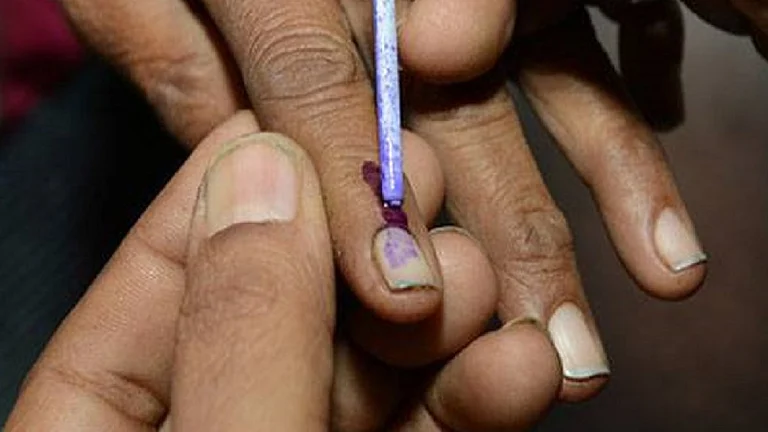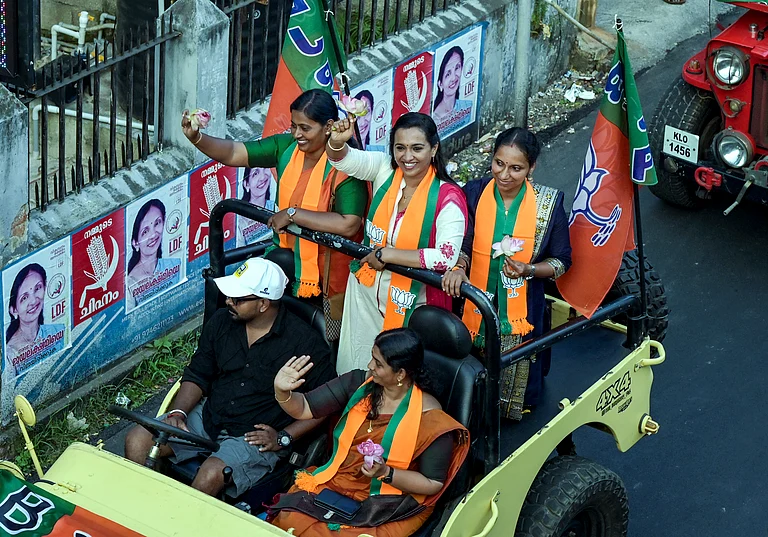It was 1994. Ayodhya was still simmering from tensions. The Supreme Court had just upheld the Central government’s acquisition of 67 acres of land at Ayodhya, including the disputed site and the areas around it—setting the stage for a decades-long legal fight that culminated with the grand inauguration of the Ram temple early this year, where the Babri Masjid once stood. Miles away … Karnataka’s Hubli, mirrored these tensions.
In August 1994, kar sevaks from here were among the most willing to ‘protect’ the national flag at the Idgah Maidan—a campaign led by senior BJP leader Uma Bharti. Two years later, in the 1996 Parliamentary polls, the BJP had won in Dharwad North (where the Hubli tensions took place).
It is 2024 and Hubli still remains on the boil.
This time over the murder of a 23-year-old student, Neha Hiremath. In the run-up to the Lok Sabha election, Prime Minister Narendra Modi and BJP leaders drummed up the killing of Neha as a case of ‘love jihad’, while also bringing up other incidents like the Rameshwaram Cafe blast in Bengaluru this March.
The saffron party, yet again, won this constituency in the recently concluded election.
Activities of the RSS
Analysts say that no single factor can explain the aforementioned trend. In 1994, Professor Janaki Nair had written about the saffron party’s prospects in Karnataka: “The success of the BJP has demonstrated its ability to adopt a variety of local issues and co-opt local sentiments.”
In some sense, this statement still holds true. Despite losing nine Lok Sabha seats and seeing its winning margins fall in 13 seats, the state BJP unit has lost only 1.41 per cent of votes this election, compared with its performance in the 2019 election. “It is not that BJP-RSS workers start their work only prior to elections,” observes KP Suresh, an independent activist and political commentator from Mangalore. Their ideological project is active throughout the year, he adds.
One such example of their ‘project’, Seva Bharati, the welfare service affiliate of the RSS, reaches out to urban slum communities in Karnataka through health and education services and economic development projects. This NGO was also among the over 94,000 NGOs that were working as “COVID warriors” with district administrations across the country in April 2020. The centres, that set up roots in local neighbourhoods, in turn, also organise field trips, lectures, and retreats to facilitate interactions with senior RSS cadres to stress on themes such as nationalism and patriotism.
“The cadres have been working in areas of Karnataka for decades now through these activities and have ended up capturing people’s minds,” observes Suresh. The Congress party cadres, on the other, hand do not have as strong an ideological campaign that has been run by the BJP cadres on the ground for decades, says Suresh.
Nevertheless, the grand old party bettered its tally from just one seat in 2019 to nine seats this time—most of them in the Kalyana-Karnataka region (also known as Hyderabad-Karnataka). However, many party legislators have since then publicly accepted that while the guarantees might have worked in backward regions like Kalyana Karnataka, they failed to garner the desired response in richer areas of Kittur Karnataka and old Mysuru regions, where the NDA instead thrived.
Meanwhile, Telangana, similar to Karnataka, has had a strong presence of the RSS. According to media reports, the RSS has about 3,500 shakhas in the State. As per their website, Saraswathi Vidya Peetham (run under the RSS education wing) currently has 172 schools in Telangana and over 37,000 students.
“Religious polarisation, as usual, exploited that (RSS) presence and allowed the BJP to occupy space created by Bharat Rashtra Samithi (BRS), which has lost its momentum,” says former bureaucrat EAS Sarma. Leaders of the BJP and other wings of the Sangh Parivar, routinely give public inflammatory speeches, often tagging Muslims as anti-nationals and invoking the ‘love jihad’ narrative, as seen in Karnataka. The same tempo continued during the 2024 campaign too. This time, with the issue of Muslim reservations.
The BJP leaders openly asserted that the Congress was appeasing Muslims through their schemes and that the former would instead do away with Muslim reservations. These claims had a cascading effect on the Muslim minorities, who had backed the BRS during the last elections. This time, these votes were transferred to the Congress and Hindu voters took sides with the BJP, especially in Nizamabad, Adilabad, Karimnagar, Zaheerabad, Mahabubnagar, Peddapalli and Medak Lok Sabha seats, where the BJP has a considerable presence.
Not Solely BJP’s Efforts
Post the bifurcation of Andhra Pradesh, the BJP’s electoral presence was only limited to Telangana in the Telugu region of South India. In the 2019 elections, the BJP won four seats in Telangana but failed to secure any in Andhra Pradesh. However, in this election, the saffron party won eight seats in Telangana and three in Andhra Pradesh (on its own).
More than a desire for change in leadership, experts say that the saffron party was able to open its account in Andhra Pradesh this time largely due to its alliance with a strong regional party—Chandrababu Naidu’s Telugu Desam Party.
The BJP, on its own, would not have made any significant inroads, Sarma says, but for its alliance with the TDP. “In fact, without the BJP, the TDP would have done better in terms of vote share and number of seats,” he adds. The YSRCP’s Jagan
Mohan Reddy initiated several welfare schemes which were popular throughout the state. However, anti-incumbency and allegations of misuse of state machinery impacted the party negatively, Sarma says.
Kerala and Tamil Nadu
Although the BJP did not win a seat in Tamil Nadu, the party's state unit celebrated the 2024 election results as a significant achievement. For the first time in Tamil Nadu's electoral history, the BJP's vote share surged to 10.69 per cent. Out of the 23 constituencies contested, the BJP secured second place in nine, and BJP-backed independents achieved second place in three other constituencies. This growth appears to have come at the expense of the AIADMK, which suffered a humiliating defeat in the 2024 Lok Sabha Election. The AIADMK's vote share plummeted from 40 per cent in 2014 to 20 per cent in 2024, marking one of the worst performances in the party's history. Similarly, the DMK also experienced a decline in its vote share, dropping from 33 per cent in 2014 to 27 per cent in 2024.
However, political analysts within the DMK are sceptical about attributing the BJP’s growth solely to its own efforts. J Jeyaranjan, a member of the Tamil Nadu State Planning Board, pointed out that the BJP contested in alliance with regional parties such as the PMK (Pattali Makkal Katchi), the TMC (Tamil Maanila Congress), and the AMMK (Amma Makkal Munnetra Kazhagam). These parties have long had a definite vote share, which contributed to the BJP’s numbers. He also noted that the DMK contested fewer seats this time (21 seats), which partially explains the drop in its vote share.
Not everyone in the DMK shares Jeyaranjan's optimism. A state-level leader acknowledged the growing societal polarisation, stating that the BJP's brand of Hindutva is gaining traction in Tamil Nadu, which might not yet be fully reflected in electoral outcomes but poses a serious challenge that needs to be addressed. Annamalai, the BJP President, despite not winning in Coimbatore, is credited with the significant increase in the party’s vote share.
In Kerala, the growth of Hindutva can be measured more tangibly. The BJP achieved a 3.6 per cent increase in vote share and won a parliamentary seat for the first time. The NDA's vote share in Kerala rose from 15.64 per cent to 19.23 per cent. Actor-turned-politician Suresh Gopi secured a victory in the Thrissur constituency, and the party came second in Thiruvananthapuram, where Union Minister Rajeev Chandrasekhar gave Congress' Shashi Tharoor a tough contest, by leading for the first two hours of counting.
Additionally, the BJP made significant gains in Kerala by winning first place in 11 Assembly segments and securing second place in nine other segments. The numbers suggest that the BJP has successfully penetrated the Christian belt in Kerala, with Suresh Gopi's victory attributed to a substantial shift in Christian votes in his favour. In six out of seven Assembly segments in Thrissur, where the Christian community has a notable presence, Gopi emerged victorious.
Compared to Annamalai, the State President of the BJP in Tamil Nadu, K Surendran, his counterpart in Kerala, does not have an equally impressive track record. Suresh Gopi’s victory in Kerala is seen more as an individual achievement rather than a party success. Gopi, often perceived as ‘Modi’s Man’, has emphasised his direct reporting to Modi and Amit Shah. Media appearances have suggested a lack of harmony between Gopi and Surendran.
Surendran, who contested from Wayanad—a stronghold of the UDF that sent Rahul Gandhi to Parliament—lost his security deposit by securing only 13 per cent of the votes. To retain the deposit, a candidate must receive one-sixth of the total votes polled, or 16.6 per cent. Despite this embarrassment, Surendran did manage to increase the BJP's vote share in Wayanad from 7.2 per cent in 2019 to 13 per cent in 2024.




























